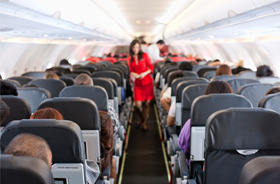[ad_1]

The International Air Transport Association (IATA) has published the “Reassessing Single Use Plastics Products in the Airline Sector” report. This document aims to guide airlines, regulatory bodies, and the airline supply chain in reducing the environmental footprint of single-use plastic products (SUPP).
The release of this report is particularly relevant as the United Nations Environmental Program (UNEP) has initiated an intergovernmental negotiating committee (INC) tasked with creating an international legally binding agreement to regulate the use of SUPP by the end of 2024.
In the aviation industry, SUPPs are commonly utilized for their durability, lightweight properties, and compliance with safety and security standards. Yet, the sector is confronted with the challenge of enhancing cabin waste management and substituting SUPPs with eco-friendly alternatives. Airlines are also navigating technical and operational hurdles, compounded by a lack of standardized, risk-informed regulations. This absence of cohesive policies hampers efforts towards more efficient recycling processes and the adoption of a circular economy in waste management. The current regulatory landscape also limits airlines’ ability to enhance the sustainability of cabin operations.
To overcome these challenges, it’s critical for stakeholders within the aviation value chain to work together. Such collaboration will be key in embracing circular economy concepts, aiming to minimize waste and increase material recovery by reducing and replacing SUPPs.
The report promotes a targeted approach to managing single-use plastic products (SUPP) in the aviation sector, offering a detailed set of suggestions. The recommendations are divided among different stakeholders in the industry:
For airlines:
- Emphasize reducing waste directly by revising existing standards and procedures with an emphasis on waste minimization and the possibility of reusing materials. Evaluate the necessity for SUPP rigorously and establish explicit objectives for reducing, monitoring, and reporting on SUPP usage.
- Encourage the adoption of reusable items as a means to foster a circular economy, which will necessitate logistical adjustments to enable a closed-loop system. This includes considering the implications of the additional weight from reusable items on fuel consumption and carbon emissions.
- Enhance waste management and recycling efforts by improving the segregation of waste on board and on the ground, and by conducting thorough audits of waste from both passenger and cargo operations.
For regulators:
- Actively support efforts to reduce SUPP by simplifying and harmonizing regulations. Develop clear guidelines that establish global standards for alternative materials, including their labeling, durability, and certifications.
- Build and support infrastructure and frameworks that enable the use of reusable items, taking into account the unique aspects of international airline operations.
- Advocate for effective waste segregation methods and share successful strategies to ensure these processes are both efficient and effective.
- Facilitate the development of waste segregation and recycling facilities near airport locations.
For the supply chain:
- Engage in solution-driven discussions with key industry players to identify and implement changes in processes that focus on comprehensive, end-to-end solutions, encourage best practices, and stimulate regulatory reforms.
- Increase collaboration between the public and private sectors and invest significantly in adopting circular economy principles throughout the airline industry’s value chain. This will necessitate substantial modifications to the practices and procedures of all stakeholders.
“Airlines are taking a comprehensive approach to sustainability that includes addressing the environmental impact of SUPP. The recommendations of this report will help airlines, regulators and the supply chain to manage the complexities of reducing SUPP. This includes finding alternatives to SUPP, creating a harmonized regulatory framework, and promoting sector-wide collaboration. Importantly, these recommendations take advantage of the expertise of all participants in the aviation sector to develop, adapt and implement the solutions best suited to an aircraft’s unique environment,” said Marie Owens Thomsen, IATA SVP Sustainability and Chief Economist.
Insights from the IATA passenger survey in November 2023 revealed that over three-quarters of passengers would have a more favorable view of flying if it eliminated SUPP usage, indicating support for reduced food and beverage options to achieve this goal. Additionally, the IATA Shipper Survey 2022 indicated that waste reduction along the supply chain is a top priority for 50% of cargo clients, with a notable demand from end customers for the reduction of plastic packaging and wrapping in cargo operations.
The post International Air Transport Association Bold Move Against Single Use Plastics in Aviation appeared first on Travel And Tour World.
[ad_2]
Source link




